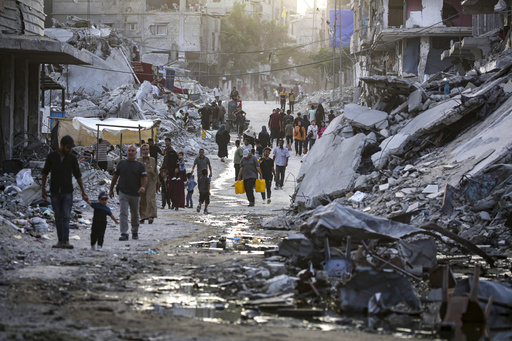The Gaza Strip is currently facing a rapid increase in the threat of polio, prompting urgent calls from aid groups to halt the ongoing war to facilitate mass vaccinations and prevent a potentially severe outbreak. Despite being polio-free for 25 years, vaccination rates dropped significantly following the start of the conflict, turning the territory into a breeding ground for the virus. With cases confirmed and suspected, along with the detection of the virus in wastewater at six different sites in July, the situation is concerning.
Aid organizations are gearing up to vaccinate over 600,000 children in the coming weeks to prevent a widespread outbreak. However, they stress that such an ambitious plan is not feasible without a cessation in the hostilities between Israel and Hamas. The World Health Organization and UNICEF have emphasized the need for at least a seven-day pause in the conflict to implement a large-scale vaccination effort.
The degraded sanitation and water systems in Gaza, coupled with the lack of proper waste disposal in overcrowded tent camps, have created a conducive environment for the potential spread of polio. The damaged infrastructure has led to the emergence of numerous waste disposal sites near residential areas, further exacerbating the health risks.
Polio is a highly contagious disease that primarily spreads through contact with contaminated feces, water, or food, posing a significant threat to young children. The imminent danger of an outbreak has prompted concerns among health workers, who fear the challenges of containing the disease without swift intervention.
Efforts are underway to conduct a mass vaccination campaign starting at the end of August, aiming to immunize 640,000 children under the age of 10 in two rounds. Both Israeli authorities and Hamas have expressed willingness to support a temporary ceasefire to facilitate the vaccination drive, as discussions for a truce are set to resume in Cairo.
The urgency for action was underscored by the detection of poliovirus in sewage samples from various locations in Gaza, indicating the potential for an outbreak due to low immunization levels and poor sanitation conditions. The decay of the healthcare system in Gaza has further complicated the response to the crisis, as medical workers struggle to cope with the influx of patients amidst the conflict.
Despite the challenges in supply chain logistics and infrastructure limitations, concerted efforts are being made to bring advanced oral polio vaccine doses into Gaza to mitigate the risk of a widespread outbreak. Elevating awareness and restoring vaccination coverage to previous levels are crucial steps in preventing the resurgence of polio in the region.
In light of the deteriorating health conditions and the pressing need for vaccinations, a temporary halt in the fighting is deemed essential to ensure the safety of children and facilitate the delivery of healthcare services. As Gaza grapples with a fragile healthcare system and limited resources, international aid organizations are mobilizing to contain the threat of polio and protect vulnerable populations from the potential devastation of a disease outbreak.


